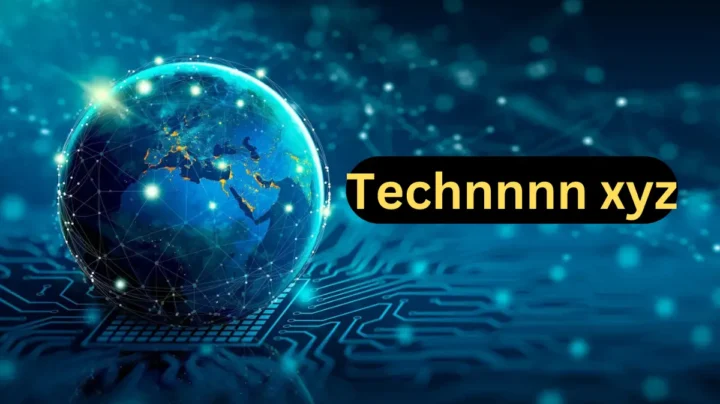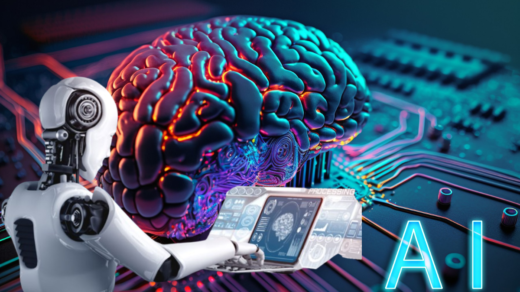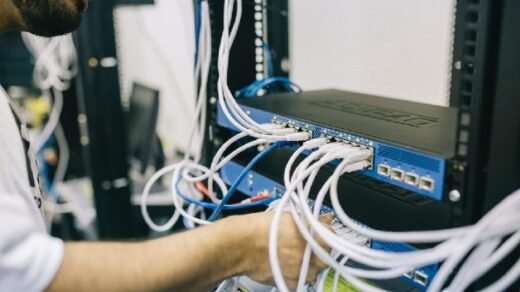Welcome to the fascinating world of Technnnn, where Technology transcends boundaries and reshapes our lives in unimaginable ways. As we stand at the forefront of this digital revolution, it’s hard not to feel a wave of excitement about what lies ahead. From artificial intelligence to virtual reality, every day brings new innovations that push the envelope of human capability. In this blog post, we’ll dive deep into Technnnn—its evolution, current trends, and future possibilities. Join us on this journey as we explore how these advancements are transforming society and enhancing our daily experiences.
What is Technnnn?
Technnnn refers to the cutting-edge landscape of technology that is rapidly evolving. It encompasses everything from artificial intelligence and machine learning to blockchain and quantum computing.
This term captures the essence of innovation. It signifies a shift toward smarter, more interconnected systems.
At its core, Technnnn represents a fusion of science and creativity. This combination drives breakthroughs that reshape industries and our daily lives.
It’s not just about gadgets or software; it’s about how these advancements transform human experiences. Technnnn paves the way for solutions addressing global challenges.
As we delve deeper into this realm, understanding its implications becomes crucial for everyone—businesses, individuals, and society at large.
The Evolution of Technology: From the Past to the Present
Technology has come a long way since the days of simple tools. Early humans crafted basic implements to hunt and gather food, laying the groundwork for innovation.
The invention of the wheel marked a monumental shift. It revolutionized transportation and trade, enabling societies to expand their horizons.
Fast forward to the Industrial Revolution. Machines powered by steam transformed production methods. This era ignited urbanization and changed lifestyles dramatically.
The digital age arrived in the late 20th century, introducing computers and the internet. Information became more accessible than ever before, connecting people across vast distances.
Today, we stand on the brink of new advancements like quantum computing and biotechnology. These innovations promise to reshape industries and enhance our daily lives in ways previously unimaginable.
Read More: SSIS 469: A Beginner’s Guide to Data Integration || Hoptraveler.com: Travel Lifestyle
Current Technological Trends and Innovations
Current technological trends are reshaping our world at an unprecedented pace. From AI advancements to the rise of blockchain, innovation is everywhere.
Artificial Intelligence continues to dominate conversations. It’s not just about robots anymore; AI assists in decision-making and enhances customer experiences across various sectors.
The Internet of Things (IoT) is another key player. Connecting everyday devices has transformed homes into smart environments, making life more convenient yet complex.
On the other hand, 5G technology is revolutionizing communication. With faster speeds and lower latency, it paves the way for innovations like autonomous vehicles and smarter cities.
Sustainability is also gaining ground in tech development. Companies are focusing on eco-friendly solutions that reduce waste while maximizing efficiency.
Augmented reality (AR) offers exciting possibilities in gaming and education. By blending digital content with the real world, it enriches user interaction significantly.
The Impact of Technology on Society and Daily Life
Technology has woven itself into the fabric of our daily lives. From smartphones to smart homes, it shapes how we interact and function.
Communication has transformed dramatically. We can connect with anyone across the globe in mere seconds. Social media platforms have redefined relationships, making them instant yet sometimes superficial.
In education, technology opens doors to endless resources. Online courses provide access to knowledge that was once limited by geography or finances.
Workplaces are also evolving rapidly due to automation and remote technologies. This shift offers flexibility but challenges traditional job structures and roles.
Health care benefits immensely from technological advancements too. Telemedicine allows patients to consult doctors without leaving home, improving accessibility for many.
Despite these advantages, a digital divide remains prevalent. Not everyone enjoys equal access to technology’s benefits, which raises concerns about equity in society.
Future Predictions for Technnnn
Future predictions for Technnnn paint an exciting picture. As we look ahead, the integration of technology into our daily lives will deepen.
Imagine smart homes that anticipate our needs. Appliances may learn user preferences to optimize energy use and enhance convenience.
Healthcare is another area primed for transformation. Wearable devices could monitor health in real time, alerting users and professionals about critical changes instantly.
Education too stands at the brink of a revolution. With personalized learning experiences powered by AI, students will engage with material tailored to their individual strengths.
Sustainability efforts will likely benefit from advanced technologies as well. Innovations such as carbon capture and renewable energy solutions promise a greener planet.
The boundaries between humans and machines might blur further as brain-computer interfaces become more mainstream. This could usher in new forms of communication and creativity unimaginable today.
Also Read: 5Starsstocks AI || Midty SSHD Pour 500gb 2.5 “sata 3 gb/s maroc
Ethical Concerns Surrounding Emerging Technologies
Emerging technologies bring a wave of innovation, but they also raise significant ethical concerns. Privacy is at the forefront. As companies harness data for better services, individuals often find their personal information exploited without consent.
Bias in algorithms poses another challenge. Many AI systems reflect existing societal prejudices, leading to unfair treatment in crucial sectors like hiring and law enforcement. Unchecked automation could exacerbate job displacement too, leaving many workers struggling to adapt.
Moreover, the rapid pace of tech development outstrips our ability to regulate it effectively. This gap can lead to unintended consequences that society may not be prepared to handle.
As we embrace these advancements, fostering discussions around ethics becomes essential. Balancing progress with responsibility will shape how technology impacts future generations. Each step forward needs careful consideration of its moral implications.
Advancements in Artificial Intelligence and Automation
Artificial Intelligence (AI) is transforming industries at an unprecedented pace. Algorithms are now capable of analyzing vast datasets, learning patterns, and making predictions with remarkable accuracy. Businesses leverage AI to enhance decision-making processes and improve operational efficiency.
Automation complements this advancement by streamlining repetitive tasks. From manufacturing lines to customer service chatbots, automation frees up human resources for more creative endeavors. This synergy between AI and automation fosters innovation across various sectors.
In healthcare, for instance, machine learning algorithms assist in diagnosing diseases faster than ever before. In finance, automated trading systems analyze market trends in real time to optimize investment strategies.
As these technologies evolve, they bring forth new capabilities that challenge our understanding of work and creativity. The landscape is shifting rapidly; companies must adapt or risk falling behind in a competitive environment driven by technological prowess.
Virtual Reality and Its Potential Applications
Virtual reality (VR) is reshaping how we interact with digital environments. It immerses users in a 3D world, offering experiences that were once relegated to the realm of science fiction.
In education, VR provides students with hands-on learning opportunities. Imagine exploring ancient ruins or navigating the human body without leaving the classroom.
Healthcare also benefits significantly from this technology. Surgeons can practice complex procedures in a risk-free virtual setting before performing on actual patients.
The entertainment industry has embraced VR too. Gamers can step into their favorite universes and experience stories like never before, making gameplay more engaging.
Moreover, businesses are using VR for training sessions and team-building activities. This innovative approach enhances collaboration and boosts employee engagement while reducing costs associated with traditional training methods.
With such diverse applications, it’s clear that virtual reality offers endless possibilities for transforming various sectors.
The Role of Technology in Sustainable Development
Technology plays a crucial role in driving sustainable development. Innovative solutions are emerging to tackle environmental challenges head-on.
Renewable energy technologies, such as solar and wind power, are reshaping the energy landscape. They reduce reliance on fossil fuels and lower greenhouse gas emissions.
Additionally, smart agriculture techniques enhance food production while minimizing resource use. Precision farming leverages data analytics to optimize crop yields with fewer inputs.
Water management systems utilize sensors and IoT devices for efficient usage. This technology ensures that water scarcity is addressed effectively.
Moreover, urban planning benefits from advancements like green building materials and eco-friendly transportation options. These elements create healthier living environments.
By integrating technology into sustainability efforts, communities can thrive while preserving natural resources for future generations. The potential for innovation continues to evolve, offering hope in the fight against climate change and resource depletion.
Conclusion: Embracing the
Embracing Technnnn means welcoming a wave of endless possibilities. It invites us to think creatively about how we can shape our future.
Every innovation carries potential for transformation. Whether it’s enhancing healthcare or revolutionizing education, the opportunities are vast.
We must remain adaptable as technology evolves at breakneck speed. Each new development opens doors that were previously unimaginable.
Collaboration across disciplines is essential. By working together, we can harness the full power of these advancements and address pressing challenges.
As we navigate this technological landscape, staying informed is key. Awareness leads to better decision-making and fosters responsible use of emerging tools.
Embracing Technnnn is not merely an option—it’s an imperative for thriving in tomorrow’s world. Our actions today will pave the way for generations to come, creating a legacy rooted in innovation and progress.
FAQs
1. What is Technnnn?
Technnnn refers to the latest trends and innovations in technology that influence our daily lives and future developments.
2. How has technology evolved over time?
From early inventions like the wheel to smartphones today, each step marks significant breakthroughs shaping human interaction with machines.
3. What are some current technological trends?
Artificial Intelligence, Blockchain, Internet of Things (IoT), and 5G networks lead today’s technological landscape with revolutionary potential.
4. How does technology impact society?
Technology changes how people communicate, work, learn, and live—creating both opportunities and challenges within communities worldwide.
5. What predictions can be made about future technologies?
We can anticipate advancements in AI capabilities, increased automation across industries, enhanced connectivity through IoT devices, and expanded applications for VR/AR experiences.
6. Are there ethical concerns regarding emerging technologies?
Yes. Issues surrounding privacy rights when using personal data or bias in AI algorithms raise essential discussions on responsible tech development.




Recent Comments